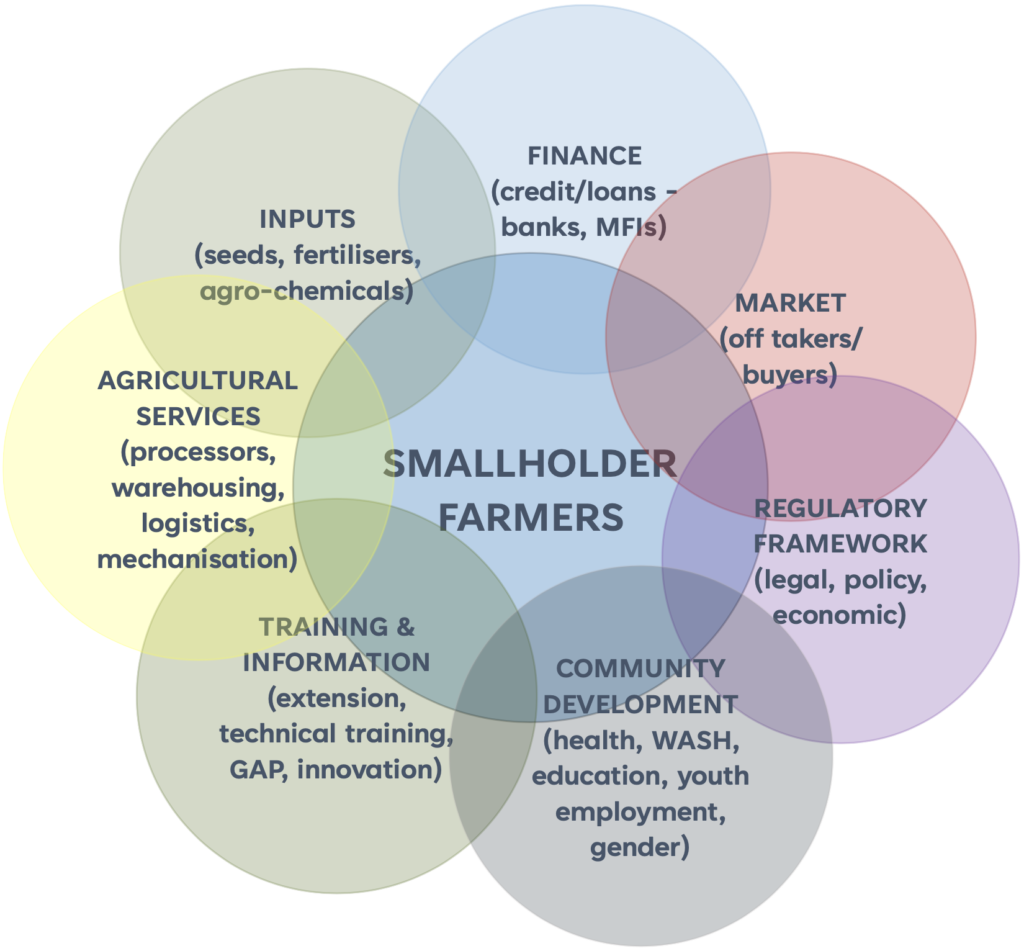OUR MODEL
Against a global background of economic instability, environmental degradation, political upheavals and social change, the Foundation continues to adapt to a changing world by keeping itself hopeful, relevant and effective.
Our Thematic Areas
Food Security & Income Generation
FOCUS AREAS
production
agri-inputs
market linkage
CROP FOCUS
Cashew
Maize
Finger Millet
Soybean
Groundnuts
Food Security & Income Generation
INTERVENTION STRATEGIES
Agricultural Productivity
Irrigation and Water Management
Diversification
Storage and Distribution
Market Linkages and Financial Services
Skills Training and Capacity Building
Climate Resilience & Adaptation
FOCUS AREAS
agro-forestry
clean energy
blue economy
CROP FOCUS
Cashew
Cocoa
Other Tree Crops
Seagrasses
Mangroves
Climate Resilience & Adaptation
INTERVENTION STRATEGIES
Agroforestry
Indigenous Food Crops
Regenerative Agriculture
Clean Energy
Blue Economy
Climate Information Services
Value Addition
–
FOCUS AREAS
agro-processing
seed multiplication
Certification and traceability
CROP FOCUS
Cashew
Sunflower
Value Addition
–
INTERVENTION STRATEGIES
Agro-processing and Agribusiness Development
Research and Development
Quality Standards and Certification
Value Chain Development
Strategic Alignment
Leveraging Commercial Business
EFF, as a non-profit organisation, can serve as a catalyst for investment in socio-economic development initiatives specifically targeting the improvement of rural livelihoods. By strategically using funds, it has the potential to leverage investments in infrastructure, logistics, network expansion, market linkages, and assets. This approach effectively complements commercial activities, particularly in areas that may not be the primary focus of the core business.
Partnerships & Networking
–
EFF has developed strong partnerships and networks with various donors and funding organisations. These partnerships form a comprehensive framework that supports its mission of driving positive change in agribusiness and community development and enables EFF to facilitate donor intent, secure funding opportunities, and effectively manage risk.
Sustainability Goals
–
EFF represents the values and focus of development programmes aligned with sustainability strategies by promoting environmental stewardship, social progress and economic prosperity. By implementing sustainable practices and integrating them into its operations and delivering impactful solutions, it can contribute to a more sustainable and equitable future for rural and peri-urban communities.
Inclusive
Growth
–
EFF has experience in designing interventions specifically targeting smallholder farmers, marginalised communities, and disadvantaged groups, facilitating better access to resources, equal opportunities, and participation in decision-making processes, especially for women and youth.
Our Farmer Engagement Model
The farmer engagement model emphasises a holistic approach, prioritising all stakeholders involved and positioning farmers at the centre of the value chain, rather than merely as recipients. It advocates for smallholder farmers to be recognised as valuable business partners rather than mere beneficiaries, fostering a more sustainable and equitable agricultural ecosystem.

